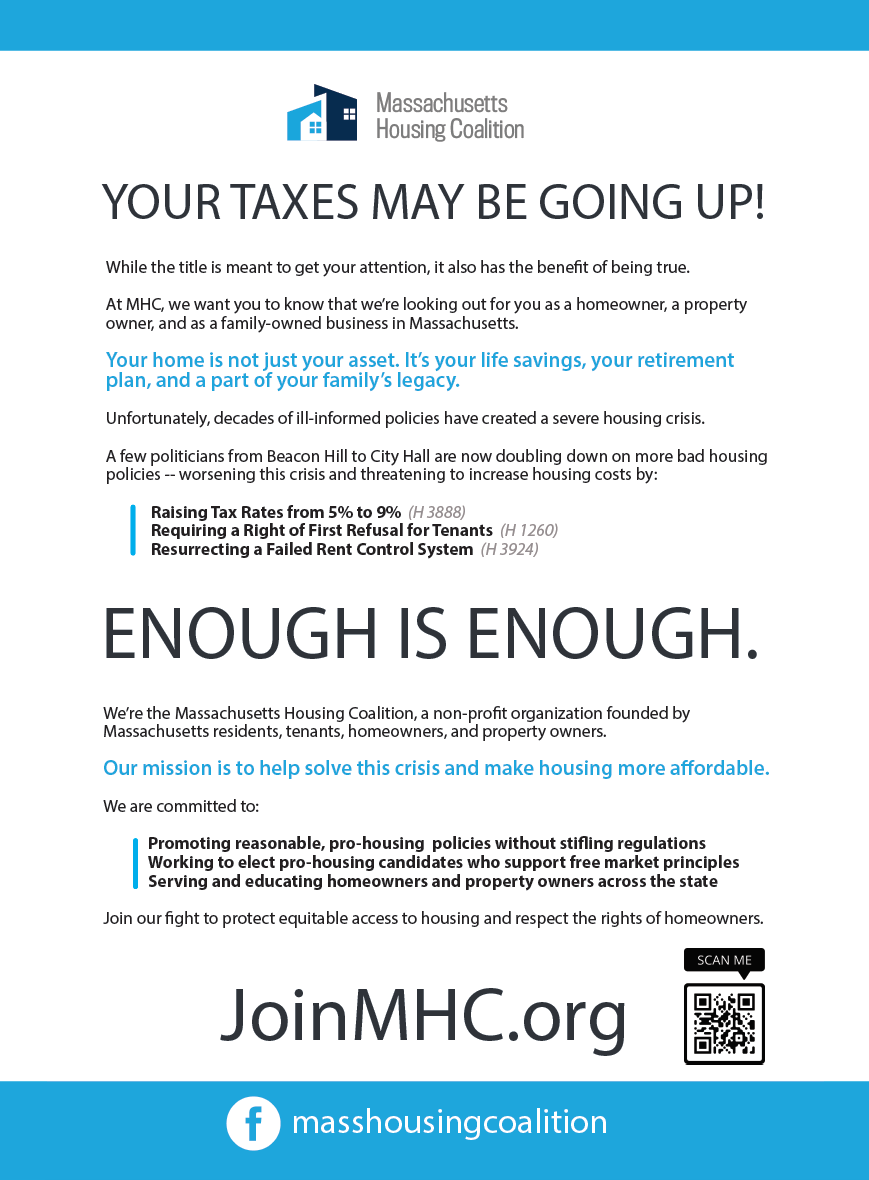Cambridge and Somerville homeowners, property owners, and business owners received a mailing earlier this year from a group called the Massachusetts Housing Coalition (MHC) criticizing legislative efforts to support tenant protections and economic justice.
The Mass. Housing Coalition letter says that their mission is to help solve the housing crisis and states that they are working to elect “candidates who support free market principles.”
However, the MHC letter actually contains several misrepresentations about legislation I’ve filed or co-sponsored.
Moreover, the MHC letter does not reflect the progressive values of Cambridge and Somerville residents or the broad consensus of leaders in our community. It seems more apt to divide our community at a time when we’ve all seen the terrible damage that can be caused by misinformation in the public discourse.
As a product of public housing, as a longtime renter in Cambridge, and as a main sponsor of the proposals MHC is opposing — today I am writing to correct the record with regard to the statements made by this 501(c)4 political organization. To be sure, we should welcome all voices in the conversation about how best to achieve housing stability, tax fairness, and racial justice. But we cannot be silent about misinformation, and the residents of our two cities deserve to know who is behind this letter and what it gets wrong or leaves out.
So who is behind the Massachusetts Housing Coalition?
The MHC website proclaims that “we must do whatever we can to solve racial and social injustice in Massachusetts.” Surely, everyone should wholeheartedly agree with that notion.
But the fact is the Mass. Housing Coalition is under the direction of real estate developers and business leaders, including the former chairperson of the political action committee that led the effort to prohibit rent control in Massachusetts in 1994. The group appears to have already spent significant sums on direct mailers, social media advertisements, staff, and consulting from corporate lobbyists, but it does not appear to disclose its donors.
MHC’s written and online materials talk about equity and justice — and they are correct when they say “decades of ill-informed policies have created a severe housing crisis” — but the truth is, they are standing in opposition to many of the very policies that are necessary to make justice and equity a reality, policies such as tenant protections and progressive taxation.
What legislation is MHC opposing?
The MHC letter takes aim at three specific pieces of legislation, each of which would actually help to achieve economic justice and racial equity, and each having strong support in our community.
Here are the bills MHC is fighting against (along with details about who supports these bills, what they would do and why they are important, and what MHC gets wrong about them):
1) An Act Implementing Progressive Options for Raising New Revenue (filed by Rep. Mike Connolly based on recommendations of the non-partisan Massachusetts Budget and Policy Center).
- MHC claims this bill will “raise tax rates from 5% to 9%.” But what they leave out is that this proposal would only apply to unearned income, such as long-term capital gains income. This sort of income overwhelmingly goes to the wealthiest 1% of households in Massachusetts. In addition, this bill also includes several exemptions for seniors, the disabled, and low-to-moderate income folks. This is in addition to existing exemptions, such as a major exclusion from capital gains taxes relative to appreciation on the sale of a personal residence.
- At present, Massachusetts has a “flat tax” on all forms of personal income. This means the billionaire who is trading on the stock market gets taxed at the very same 5% rate as the person who is earning minimum wage mopping floors or waiting tables. That’s inherently inequitable — and there will never be tax justice or racial equity in our state unless we change that.
- According to MassBudget, 80% of the income targeted by this proposal goes to the wealthiest 1% of households, whereas just 3% of the income targeted by this proposal goes to the bottom 80% of households. And that’s before including the additional exemptions we have proposed for lower-income households, seniors, and people with disabilities.
- Last fall, a majority of Cambridge and Somerville school committee members signed a letter in support of this concept, noting how progressive revenue is essential to advancing the cause of educational equity across Massachusetts.
- In addition to education, new progressive revenue is desperately needed to fund investments in transportation, housing, and other vital social services. This is because Massachusetts has been operating in a state of austerity for the past two decades.
2) An Act to Guarantee a Tenant’s Right of First Refusal (this would provide tenants with an opportunity to purchase their buildings at market value in certain cases when an owner decides to sell, a concept tirelessly advanced by former Somerville Rep. Denise Provost and now championed by Cambridge Rep. Jay Livingstone and Somerville Senator Pat Jehlen).
- This concept, also known as “Tenant Opportunity To Purchase” or “TOPA” would give tenants the opportunity for homeownership and allow them to partner with local nonprofits to match the purchase price of a third-party purchaser. Supporting this kind of ownership is vital to equity and is a sustainable and efficient way to support affordability.
- The legislation includes broad exceptions for small landlords who reside in Massachusetts and own up to 6 units of housing. It also exempts certain transfers to family members.
- The window of opportunity for tenants to purchase their building is very narrow, as little as 15 to 30 days, and in all cases the property owner gets to retain “the benefit of the bargain” (i.e. whatever the property can fetch on the open market is what the owner is entitled to receive).
- This bill is a top priority for the Chinese Progressive Association, the Massachusetts Homes for All Coalition, and many other prominent housing advocates.
- Last session, the TOPA concept was passed by the House of Representatives as part of a larger bill (H.4887) which passed by a vote of 156 to 3, with all Democrats and all Cambridge and Somerville Reps. voting in support. However, Governor Baker vetoed the TOPA section of the bill at the end of the legislative session.
- The TOPA concept is strongly supported by Cambridge and Somerville City Councils. The Somerville City Council unanimously sponsored a resolution calling for a Tenant Opportunity to Purchase ordinance on January 14, 2021. The Somerville City Council also unanimously approved a home rule petition for a Tenant’s Right To Purchase in 2019. The Cambridge City Council also went on the record in support of TOPA in early 2021.
3) An Act Enabling Local Options for Tenant Protections (co-lead filed by Rep. Connolly and Boston Rep. Nika Elugardo, and introduced in the Senate by Springfield’s Adam Gomez; this was originally drafted in partnership by Black-led housing justice organizers at City Life/Vida Urbana).
- MHC claims this bill is “resurrecting a failed rent control system.” However, that is simply false. Rather, the Tenant Protection Act is all about allowing municipalities to consider new rent stabilization options. This means our city officials will be empowered to bring everyone to the table — renters, homeowners, and landlords alike — to craft tenant protections that make sense on the local level.
- Since introducing this bill in 2019, the push for tenant protections has gained considerable momentum. Senator Elizabeth Warren made overturning statewide bans on rent control a key part of her housing platform during her 2020 run for the White House. And Bernie Sanders went even further, calling for a national rent control standard. Mayor Joe Curtatone and Mayor Sumbul Siddiqui are also in support of this bill. Mayor Joe Curtatone highlighted it in his most recent inaugural address, and Mayor Siddiqui called it a critical step to prevent tenant displacement.
- On December 12, 2019, the Somerville City Council voted unanimously to support the Tenant Protection Act.
- On June 29, 2020, the Cambridge City Council voted 8-1 to support the Tenant Protection Act.
- Last year, the Tenant Protection Act was advanced favorably by the legislature’s Joint Committee on Housing on a vote of 13 to 2 — this is the most progress we’ve seen for rent control on Beacon Hill in over 25 years. The public hearing on this bill drew hundreds to the State House, and a rally for the bill attracted national attention. Perhaps it’s no coincidence that the Mass. Housing Coalition got up and running just as this bill started gaining momentum on Beacon Hill.
- Meanwhile, Oregon, New York, and California have all passed comprehensive rent control bills in the past two years, and 76% of Boston residents now say they support rent control.
In conclusion, not only does the Mass. Housing Coalition get some of the key facts about these bills wrong — their negative stance on these bills is at odds with their stated goals of equity and justice, and it’s also at odds with the progressive values of our community.
When I met with MHC to discuss their letter, a representative of MHC even stated that “just because you are a tenant doesn’t afford you a class of rights.” As outlined above, leaders in our community disagree.
In a community that is the target of global real estate speculators and home to multibillion-dollar universities and corporations — we must affirm that housing is a human right, and we must recognize that equity will only be possible if we take action to protect tenants and make our tax code more fair.
Tenants have a right to remain in our community, free from the threat of economic eviction. And the very wealthy must pay their fair share in taxes. It is our job as policymakers, organizers, and community members to work to bring everyone to the table to make this vision of justice and equity a reality.


